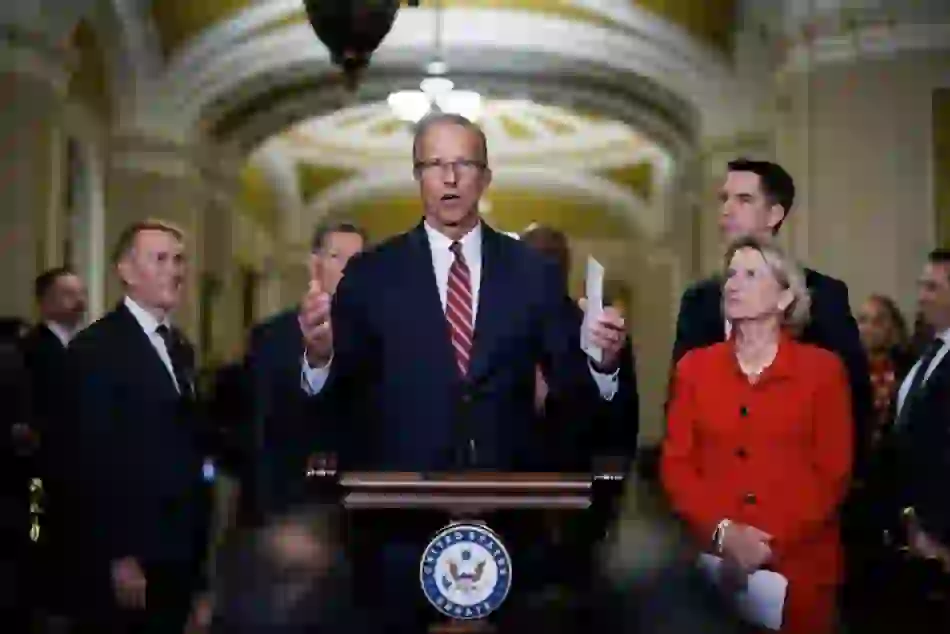Senate Republicans’ choice of Senator John Thune (R-S.D.) as Majority Leader reaffirmed a vital but little-known historic tradition. Former President Donald Trump had just won the presidential election, and by a coincidence, the Majority Leader post was vacant (with Senator McConnell stepping down as minority leader) and open for being filled. Trump’s vocal supporters had pushed for another candidate, Senator Rick Scott of Florida. Scott was deemed a “MAGA” enthusiast in a way that Thune was not. Though seemingly there was some sense that might be an initial test of loyalty to Trump, Thune won.
TOPSHOT – US Senator John Thune (R-SD), newly elected Senate Majority Leader for the upcoming 119th … [+]
AFP via Getty Images
.
There was little discussion of the history of the Senate Majority Leader post. But, under the surface, a historic principle of the institution was up in the air: When the President’s party and the Senate majority party are the same, it is of great institutional importance to whom the post belongs, President or Senate.
The institutional structure of the Senate has come over time to give the rudder to the Senate Majority Leader. That has emerged by historic precedents, step by step. There is no Senate Majority Leader in the Constitution. There was none in the nineteenth century. The position gradually developed in the twentieth century.
There is one historic incident which set the institutional pattern as to whom the post belonged to, President or Senate. President Franklin Roosevelt had a close relation with Senator Alben Barkley (D-Ky.) (Barkley may not be well known today, but he was a big figure at the time, later becoming President Harry Truman’s Vice President in 1949-53). Roosevelt used his influence in the Senate Majority Leader choice in 1937, which Barkley won dramatically by a single vote. Over the following seven years Barkley had become “the president’s man” in the Senate – a matter of no small importance in the leading of the Senate into World War II.
Then, in 1944 the two tangled over a major tax bill. Congress passed the bill, and over Barkley’s advice – as the voice of the Senate — Roosevelt vetoed it. Barkley publicly resigned as leader. “My resignation will be tendered and my services terminated,” he proclaimed, and then added, “If the Congress . . . has any self-respect left, it will override the [president’s] veto.”
For the Senate Republicans to have rejected Thune for Scott would have undone the pattern since 1944. It would have changed the institution around, to one in which, as with Barkley and Roosevelt before 1944, the Majority Leader was the President’s man.
A caveat should be stated. Of course, Thune has pledged loyally to move Trump’s agenda, and none of this is in the least to the contrary. There have been some renowned Senate Majority Leaders loyally moving their President’s agendas. A notable example is Majority Leader Howard Baker (R-Tenn.), who after the election of 1980 moved President Ronald Reagan’s agenda. And, that was no small agenda. It was a combination of enormous tax cuts, and purported enormous expenditure savings. That was historic service. Thune is expected to do the same. So, look to Thune to move the Trump agenda.
At the same time, the Senate Majority Leader is the voice of his Republican conference, exercising weighty judgments. During Trump’s first term, he demanded that Majority Leder McConnell allow easy overcoming of minority filibusters by abolishing the 60 vote requirement. McConnell changed the requirements for Supreme Court Justices, but not legislation. It is early to predict how the issue of cloture will play out this Congress. But, it is safe to say that because Thune is the voice of the Republican conference, he will be coming from a different place on the question than if he were just the President’s man.











